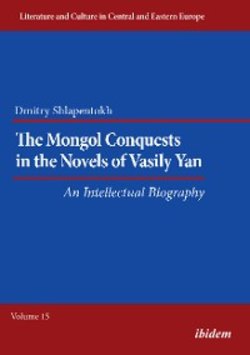Читать книгу The Mongol Conquests in the Novels of Vasily Yan - Dmitry Shlapentokh - Страница 4
Introduction
ОглавлениеThere are several reasons to write this short book. Some of them are rather obvious. Vasily Yan was a writer of historical novels whose popularity survives the test of time. He was widely read throughout the Soviet era and continues to be popular in the post-Soviet era; at least, his works have been reprinted up to the present.1 This is a rare feat. Most official/semi-official authors of Soviet historical novels were absolutely forgotten. Yet, despite his apparent popularity among Russian readers and numerous translations into other languages, nothing has been written on Yan in any non-Russian language and no detailed analysis of his works in the historical context exists.
What was the reason for Yan’s popularity? One might state here that he was a talented and educated author with broad life experience, who could bring to life events from bygone eras. But he was not exceptional: there were several Russian writers who were equally talented and dealt with similar dramatic events in Russian and world history. Thus one could assume that a major reason for Yan’s popularity was the nature of the novels’ subject. His writing on the Mongol invasion dealt not only with the perennial problem in Russian history—perpetual conflict with foreign powers—but also extensively with Russia’s conflict with Asia. Moreover, it dealt with periods when Russia was not victorious. The Mongol invasion was in fact the only period in Russian history when the country was taken over by foreign forces; moreover, these invaders were not Europeans but Asians. And this situation possibly perplexed Russians more than anything else.
There were a few periods—the early Soviet and, curiously enough, early post-Soviet era—when quite a few Russian intellectuals regarded Russia as a mostly Asian power, or at least saw in Asia not just an economic and geopolitical partner but a place of true kindred people. Still, through most of modern Russian history Asia was rejected or plainly ignored. Susanna Soojung Lim demonstrated well that China and Japan, major Asian powers, were marginalized in Russian intellectual discourse from the 17th century to the end of tsarist regime. If they occasionally reemerged in Russian intellectual narrative it was mostly to demonstrate their cultural backwardness and economic and military weakness. Some Russian writers such as Grigorii Petrovich Danilevsky (1829–1890) did envisage an era when China would be a great power. But even in these cases China’s rise was mostly due to Russia’s encouragement and help. Interest in Asia was usually a reflection of Europeanism. For example, as Lim demonstrated, the interest in Chinese culture in the 18th century was simply a reflection of European, mostly French interest in China, viewed by protagonists of the European Enlightenment as the ideal monarchy ruled by a “philosopher king.” While Russian intellectual elites might be fascinated by a Europeanized version of Asia, they had neither interest nor fear with regard to Asia perse. Indeed, St. Petersburg looked at Asia as an easy object for conquest, following the pattern of European powers. Asians were clearly marginalized in the nation’s narrative, at least in comparison with Europeans. Even Slavophiles regarded Europe as the point of departure and target for their barbs and mostly ignored or at least marginalized Asia.
